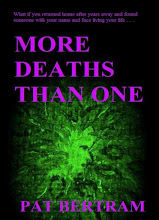Although I am not a fan of long descriptive passages, or even short ones that add nothing to the story, I do think that setting is important. We readers need to know where we are, and why. We need enough description to get our imaginations flowing, though not so much that we feel the story is the author’s alone; we want to be a participant in the process.
Setting need not be static. It can be a character with its own personality, scars, weaknesses, strengths, emotions, and moods. Like the other characters in the story, we should get to know it little by little, not in big chunks of exposition. And, like the characters, it should change; or at least our perception of it should change.
The space given to description should be in relation to its importance. There is no point in writing a long description of a setting that will disappear from the book before the readers have fixed it in their minds. For one thing, it delays the action unnecessarily; for another, readers won’t forgive the false impression.
For my work in progress, I envisioned a fabulous pet store. It was a standalone building with its own parking lot. The building was in the shape of a U, with the main room across the front and two wings. Because it was once a doctor’s office, there were several little rooms in each wing. My character, Chip, created special habitats in the rooms, like a mini forest for the owl and a large terrarium for the reptiles. In the center of the U was a courtyard that the doctors once used for an outdoor eating area, but Chip had enclosed it with wire mesh, filled it with exotic plants and small trees, and used it as a retreat for the birds and small animals.
As I was designing the store, I encountered several problems: the birds were tropical, and would not have done well outside in Denver’s harsh climate. The terrariums for the reptiles would turn into charnel houses because the creatures would eat each other. But even with the problems, I was loath to implode my store; I spent a lot of time creating it and I thought it was a great idea.
Then I started writing it. To make it more than a lifeless description such as the one here, I had to give it several paragraphs and for what? Within a few short chapters the store would disappear (along with the entire neighborhood). It didn’t make sense to give so much space to something that was obviously unimportant when a plain old store would work just as well and with fewer descriptive words to delay the action. Besides, anything the fabulous store said about Chip was more entertainingly portrayed by his relationship with the animals.
While my setting — Denver in the not too distant future — is important, the store wasn’t. Whatever words I would have wasted on the store, I will spend creating a living, changing, vital setting for Chip to interact with. Because of that interaction, I won’t need long descriptive passages for readers to skim over.
That’s the plan, anyway.
I’ve always enjoyed working with my hands to create original art pieces and
because I’ve tried quite a few different areas of art, I rather quickly
realize...










No comments:
Post a Comment